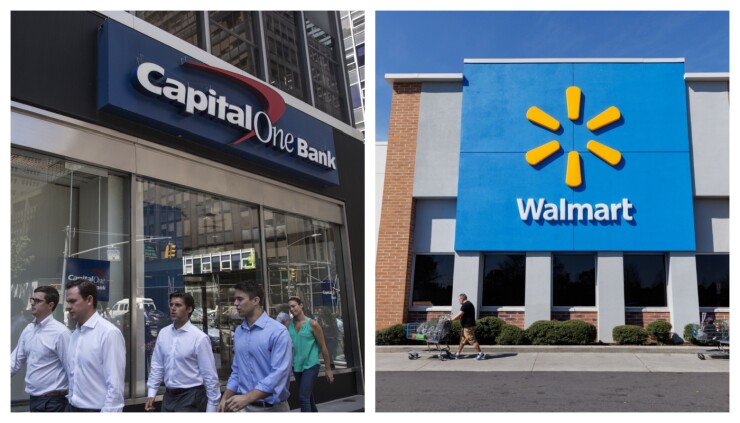
In a new court filing, Capital One also accuses Walmart of trying to abandon a long-term deal the two companies struck back in 2018 because the retail chain wants to move its credit card business to a fintech joint venture in which it has a controlling interest.
The Walmart-backed fintech venture, known as One, has been in development for about two years. It currently offers a debit card to Walmart customers.
"Walmart is positioning itself to compete directly with Capital One to provide credit and payment products to Walmart customers," Capital One said in its court filing.
Capital One's allegations came in response to
Walmart spokesperson Randy Hargrove denied Capital One's allegations.
"Capital One's claims are false, and we will address them in court," Hargrove said Tuesday.
"We fulfilled our obligations to promote the Walmart credit card as the exclusive consumer credit card program within Walmart-branded channels," he said.
Hargrove declined to comment specifically on Capital One's allegation that Walmart is planning to move its credit card program to the fintech joint venture. But he said that Walmart expects to bring a new credit card program to its customers within the next 12-18 months.
In the meantime, he said, shoppers can continue to use Walmart-branded credit cards issued by Capital One.
The fintech venture backed by Walmart, which is run by
In its lawsuit, Walmart alleged that Capital One failed to meet certain customer-service benchmarks, which gave the retailer the contractual right to terminate the deal.
One of those benchmarks involved posting customer payments within one business day of when they were received. Capital One was supposed to post conforming payments within one business day in 97% of cases, but it only did so 55% of the time at one point, and 86% of the time at another point, according to Walmart's lawsuit.
In Capital One's response to the April 2023 lawsuit, the card issuer argued that the customer-service issues had no meaningful impact on either Walmart or customers — and that Walmart deliberately misinterpreted the contractual provisions that involve the right to terminate the deal in connection with customer-service shortcomings.
Capital One also said that Walmart's purported concerns about customer service were merely a pretext to get out of a contract that the retailer wanted to terminate for other reasons.
"Walmart's lawsuit is an attempt to extricate itself from the partnership it agreed to just a few years ago because it no longer likes the economic terms," a Capital One spokesperson said in an email. "Capital One disputes Walmart's unfounded claims and is pursuing counterclaims for Walmart's failure to perform its contractual obligations to market the card program, thereby stymying its growth and profitability."
Capital One's court filing made several allegations related to Walmart's efforts to market the credit cards. For example, the card company said that Walmart refused to incentivize its stores to promote the cards and failed to train in-store employees to do so.
Capital One said that when it raised the marketing issues with Walmart, the retailer initially offered excuses. But Walmart later conveyed that it did not believe the terms of its deal with Capital One were sufficiently favorable to justify any real investment in advertising the cards, according to Capital One's court filing.
In both 2021 and 2022, Walmart and Capital One fell far short of their goal regarding the number of cards issued, according to Capital One. The specific numbers were redacted from Capital One's public court filing.
"Walmart's repeated, bad-faith refusals to adhere to its contractual marketing obligations have directly contributed to the Card Program's disappointing performance," the credit card company alleged.
The Capital One partnership is not the first time that Walmart's relationship with a credit card issuer has turned sour.
After Walmart announced its deal with Capital One in 2018,
The lawsuit






